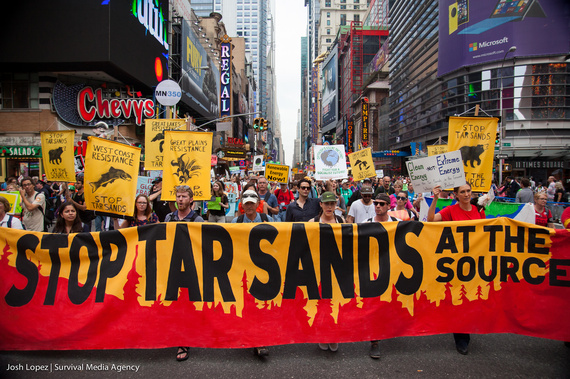Votes are still being cast, but we already have a sense of what this election means for the fight against the Keystone XL tar sands pipeline.
When it comes to the pipeline, these midterms have been rather like Macbeth's dour take on life, "a tale, told by an idiot, full of sound and fury, signifying nothing." No matter who is in office once the dust settles, nothing has changed about the fundamental dynamics of Keystone XL. This is still President Obama's decision--and he has all the facts he needs to reject the project.
This has never been Congress' call, despite their regular chest-thumping. The House has voted eight-separate times to approve the pipeline extension, to no avail. Meanwhile, the Senate has so far failed to get the 60 votes necessary for a bill that would approve the pipeline.
That could change on Tuesday -- most models show the Republicans picking up enough seats to take the Senate. What they won't get, is a veto-proof majority. The handful of Democrats that voted for Keystone XL during pre-election posturing are unlikely to vote with Republicans if it came to overriding a presidential veto.
And a veto is exactly what we can expect from President Obama. After all, what is in an approval for the president? The nation's top climate scientists have made it clear time and again that Keystone XL is a disaster for the climate. Post-election, President Obama will start focusing on his legacy, and pipeline approval would tar over whatever climate bonafides the president has in mind.
What about if the President doesn't care about his legacy and just wants to help out Democrats and set up the 2016 election? Handing a major win to the Republicans and the Koch Brothers would be an odd way to tee up the next election cycle. That's especially true if Hillary Clinton is planning to run for president. Clinton was Secretary of State when the Department first reviewed the pipeline. Before the review was even over, Hillary said she was "inclined to approve" the project. An approval now would tar her just as much as Obama and all but guarantee regular pipeline protests throughout the primaries, as well as further open up the space for a progressive primary challenger.
On the other side, a rejection could be just the thing to help energize the progressive base that Democrats are going to need in 2016. Young people, in particular, overwhelmingly support politicians who are offering up bold climate solutions. Democrats--and Hillary, in particular--have a lot to prove. The climate movement has shown itself to be a powerful mobilizing force, turning out 400,000 people into the streets on September 21 for the People's Climate March. Those people, and millions more, are looking for candidates who are willing to stand up to Big Oil.
Meanwhile, outside of the Beltway, back in reality, new hurdles keep getting in the way of Keystone XL. The pipeline's route is in more limbo than ever before because of a court case in Nebraska. After the original pipeline route got thrown out because it went through the fragile Sand Hills area, Nebraska's governor rubber stamped a new route for the project and sent it back to the State Department for review (as many landowners have pointed out, the route still threatens the critical Ogallala aquifer and other precious resources). As it out, the Governor might not actually have the authority to approve pipeline routes, only the legislature. Whoops. If the court case goes in the favor of pipeline opponents, it will throw the whole project into question.
That's not all. Thanks to a nearly six-year delay, the pipeline's permit in South Dakota has expired. TransCanada is reapplying, but this time they're facing a well-organized resistance, led by Native American tribes in the region. Tribal leadership has shut down similar pipelines across Canada and will continue to play a more prominent role in the United States, as well.
There's no doubt that a Mitch McConnell controlled Senate isn't good news for the planet. But no matter the outcome of the election, momentum is still on the side of pipeline opponents. Our movement is stronger, better organized, and larger than ever before. Big Oil wants to push Keystone XL after November 4? I say, bring it on.

